Strategies for Managing Soil Erosion in Your Garden
Learn effective strategies to manage soil erosion in your organic garden, crucial for Bangalore's varied terrain. This guide provides insights into sustainable practices like terracing, mulching, and cover cropping, essential for preserving soil integrity and promoting a healthy garden ecosystem.

Introduction:
Soil erosion is a significant challenge for gardeners, particularly in areas like Bangalore with its varied terrain and weather patterns. Effective management of soil erosion is crucial to maintaining a healthy garden ecosystem. Vriksha Farms is committed to educating gardeners on sustainable practices to combat soil erosion, ensuring the longevity and fertility of their gardens.
Understanding Soil Erosion:
Soil erosion occurs when topsoil is worn away by wind, water, or human activity. This can lead to a loss of nutrients, reduced soil fertility, and disrupted plant growth. In an organic garden, preserving topsoil is essential for maintaining a productive and sustainable environment.
Sustainable Practices to Manage Soil Erosion:
- Terracing: In sloped gardens, terracing can significantly reduce runoff and soil erosion. It involves creating stepped levels, which help retain water and soil.
- Mulching: Applying a layer of organic mulch helps protect the soil from erosion by reducing water runoff and providing a barrier against wind.
- Cover Cropping: Growing cover crops, such as clover or ryegrass, can effectively prevent soil erosion. These plants protect the soil surface and improve soil structure.
- Planting Windbreaks: Strategic planting of trees or shrubs can serve as windbreaks, reducing wind speed and consequently, soil erosion.
- Rainwater Harvesting: Collecting and redirecting rainwater can help manage water flow in the garden, reducing the force of water runoff and soil erosion.
Importance of Soil Structure:
Healthy soil structure is key in preventing erosion. Practices like composting and avoiding over-tilling help maintain soil integrity and reduce the risk of erosion.
Benefits of Erosion Control:
Controlling soil erosion is beneficial not just for maintaining soil health but also for conserving water, protecting plant roots, and preserving the garden's biodiversity.
Conclusion:
Managing soil erosion is an integral part of sustainable gardening, especially in a diverse environment like Bangalore. By implementing these strategies, you are taking important steps to protect your garden's soil, ensuring its health and productivity for years to come. As part of the Vriksha Farms community, your commitment to sustainable practices contributes to a healthier, more resilient garden ecosystem.
Call to Action:
Join Vriksha Farms in embracing sustainable gardening practices to combat soil erosion. Explore our managed farmland plots, ideal for implementing effective soil erosion management techniques. Begin your journey towards a more sustainable and resilient garden today.
